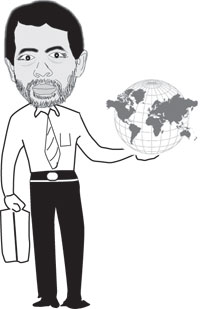
Foreign service: Kohona speaks of language and restructuring
But how far he will succeed will depend on the support he can garner at the highest political levels in government -- which he now commands -- and his ability to fight bureaucratic resistance in his own backyard.
Perhaps he is conscious of the old axiom that in Sri Lanka every government finds itself defeated by its own bureaucracy -- sooner than later. The service has had its peaks and valleys under the guardianship of no less than three Foreign Ministers since the assassination of Lakshman Kadirgamar in August 2005. He says there are those who work very hard, and have done extremely well on behalf of their country. But there are many who haven't had the same attitude towards the foreign service. At the management level, this aspect has been neglected. During his three-month tenure as Foreign Secretary -- a post he assumed in January while still heading the Peace Secretariat -- Kohona has discovered there are "very good career officers who would be a credit to any foreign service in the world." But there is also plenty of deadwood. "The thing is to encourage those who are good, and try and help those who are not that good. The rest should be persuaded to find other vocations," he said, during a recent visit to his old stomping grounds in the corridors of the United Nations. "I also want to make sure they are proficient in more languages than their own. Some of them have problems even with English," he complained. At a meeting with Sri Lanka diplomats in an English-speaking capital last month, he discovered that at least one of the officers was struggling to communicate in English. To avoid the embarrassment, Kohona switched to the native language. Ideally, he says, our diplomats based in Beijing should be fluent in Chinese, those in Britain should be fluent in English and those posted to Japan should speak Japanese. "To have a Sri Lankan ambassador in Paris who does not speak French is a waste of tax payer's money," he points out. He says most of the foreign services -- including those in our neighbouring countries -- insist on language skills as a requirement for career diplomats. The foreign ministry will provide incentives and opportunities for language training. And he sees no problems for Sri Lankan diplomats assigned to UN offices in New York or Geneva because language classes -- in English, French, Russian, Chinese, Spanish and Arabic -- are provided free by the United Nations. All six are official languages of the UN. But how many have availed themselves of these opportunities? He insists that our diplomats should use these opportunities when they are assigned to both duty stations. Kohona has served both in Geneva and New York. There will be a process of continuous training even as language skills will be a significant factor that will be taken into consideration on future promotions and transfers. He also points out there is a "serious dearth" of diplomats fluent in Chinese, Japanese and Korean. He plans to set this right particularly at a time when China, Japan and South Korea are fast emerging as Sri Lanka's vibrant trading partners. Asked if the 60-year retirement rule will be strictly enforced, he said that was a decision taken by the government at the highest political levels. As a result, career diplomats will complete their contracts in the ministry when they reach the age of 60. But this will not apply to political appointees. Still, contracts have been written in such a way that the government has the right to terminate them. He is also sceptical of past appointments of septuagenarians and octogenarians as diplomats overseas. In fact, one of them based in a European capital has sought an extension of his contract purely on the ground that he has a direct pipeline to the Pope. And as he continues his visits to various capitals, Kohona sees widespread deficiencies in the administration of some of our embassies and high commissions overseas. A significant part of the problem is also the quality of the administrative and support staff. Asked if they were political appointees, he said: "I do not know what the appointments are, but I have come across people who are supposed to do secretarial work who cannot use computers.""I have also spoken in public about gardeners being sent to our embassies and missions which do not have any gardens, and drivers without the ability to drive or even read traffic signs. I plan to rectify the situation immediately and absolutely." He says he wants to raise standards across the board -- not only in the diplomatic service but also in the administrative support services. "We have a tendency to consider administrative staff to be somewhat different from the career service which is not the case because when you are overseas, you have to pitch in and help with the work of the mission at short notice." |
|| Front
Page | News | Editorial | Columns | Sports | Plus | Financial
Times | International | Mirror | TV
Times | Funday
Times || |
| |
Copyright
2007 Wijeya
Newspapers Ltd.Colombo. Sri Lanka. |
 Palitha Kohona, who spent 12 years as a diplomat in the Australian Department of Foreign Affairs and Trade and 11 years as an international civil servant heading the UN treaty section in New York, is determined to restructure and revitalize Sri Lanka's foreign service.
Palitha Kohona, who spent 12 years as a diplomat in the Australian Department of Foreign Affairs and Trade and 11 years as an international civil servant heading the UN treaty section in New York, is determined to restructure and revitalize Sri Lanka's foreign service.